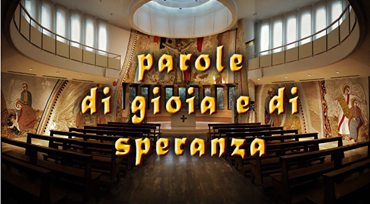Sunday Commentary
THIRTY-FOURTH SUNDAY IN ORDINARY TIME – SOLEMNITY OF CHRIST THE KING – November 22 2020
o, cursed people, out of my sight into the eternal fire, which has been prepared for the devil and his angels” (Mt 25:41). These are the most terrible words that we find in the Gospel and are not the only ones on the lips of Jesus. Luke and Matthew remember others: “I don’t know where you come from! Away from me, all you workers of evil” (Lk 13:27). “The Son of Man will send his angels, and they will weed out of his kingdom all that is scandalous and all who do evil. And these will be thrown into the blazing furnace, where there will be weeping and gnashing of teeth” (Mt 13:41-42). “Bind his hands and feet and throw him into the dark” (Mt 22:13). “But his master will come on the day he does not know, and at the hour he least expects. He will dismiss that servant, and deal with him as with the hypocrites. There will be weeping and gnashing of teeth” (Mt 24:50-51).
These phrases are clearly etched in our minds. They have inspired legions of artists who painted scenes of terror, despair, and torment. They have suggested lyrics such as the Dies irae, the most impressive of the descriptions of the Last Judgment. They have offered inspiration to musicians who have translated into soundsthe anguish of the crucial moment when Christ will pronounce the final judgment.
The judgment of God as the Gospel presents continues to be seen by many today as a dramatic rendering of account. Thus, an encounter with the Lord, far from being desired and expected, is for everyone a bigunknown, even for the righteous. In the face of the One who “who can charge his angels with error” (Job 4:18)who can feel safe? Many Christians already consider a great luck being able to take a few years off frompurgatory.
Is this the justice of God?
To internalize the message, we repeat:
“Let the heavens rejoice and earth be glad because the Lord judges the world… with his justice.”
First Reading: Ezekiel 34:11–12,15-17
In 587 B.C. Jerusalem and its marvelous temple were destroyed, the walls razed to the ground. The Babylonian soldiers gave themselves up to all sorts of violence and barbarism. Someone escaped themassacre by taking refuge in the desert, some other fled into Egypt, many were taken prisoners and exiled toa foreign land. In the village, only the poorest remained: some winemaker, a peasant, a few craftsmen.
After a few years, and among those who remained at home, the more skilled and savvier begin to emerge. They know how to take advantage of the situation of extreme need faced by the majority of the people. They exploit those who are impoverished by misfortunes and woes. They buy, sell, unscrupulously traffic goods and so are able to enrich themselves.
It is at this sad time that the prophecy being proposed to us today is announced. Thinking back to themisfortunes that have struck his people, Ezekiel compares the Israelites to a flock without a shepherd and in disarray; and pronounces at the same time a message of salvation. He does not announce the advent of other kings, who would not have been the best precedents that had led the people to ruin. Instead he promises thatGod will personally take care of his sheep (v. 11), will gather them from all the places where they weredispersed “in a time of cloud and fog” (v. 12), and will take them to good pastures on the high mountains of Israel (v. 15).
Then he directs a threat to those who hoard goods trampling on the rights of the weakest. To his “flock,” the Lord assures: “I will distinguish between one sheep and another; and set apart rams and goats” (v. 17). It is the promise of his prompt intervention in favor of the oppressed, the poor, and the exploited.
Second Reading: 1 Corinthians 15:20-26,28
The rabbis believed that at the coming of the Messiah, a first realm would begin—called the “kingdom of the Messiah”—which would be succeeded by a second, the “kingdom of God.” Paul—educated at their school—had assimilated this opinion and thought that the first kingdom would last as the history of humankind andwould conclude at the end of the world.
It is in this historical perspective that today’s reading is understood. Paul is convinced that gradually the Messiah will destroy, during his reign, all his enemies. His victory will be complete when the last adversary,death, is finally defeated (vv. 25-26).
The enemies whose annihilation is announced are not persons but the forces of evil, all that prevents people to live in fullness their own existence in the world. These are disease, famine, or nakedness, ignorance, slavery, fear, hatred, selfishness, and sin. When these negative realities disappear, then the kingdom of the Messiah can be said as accomplished. For this reason, anyone who is committed against these evils—even if he/she is not Christian, though not a believer—collaborates on the project of the Messiah.
When this kingdom will be established in the world and the enemies of Christ, including death, have beendefeated, then he will hand over to the Father his reign and the kingdom of God that will last for all eternity will begin (v. 28).
After this explanation, the reading’s first verses are clear (vv. 20-24). Christ did not eliminate biological death: the human body, like that of every living thing, wears out and ends up being consumed. He has conquered death because he has deprived it of its meaning of annihilation, total destruction and turned it into abirth to the full and definitive life.




